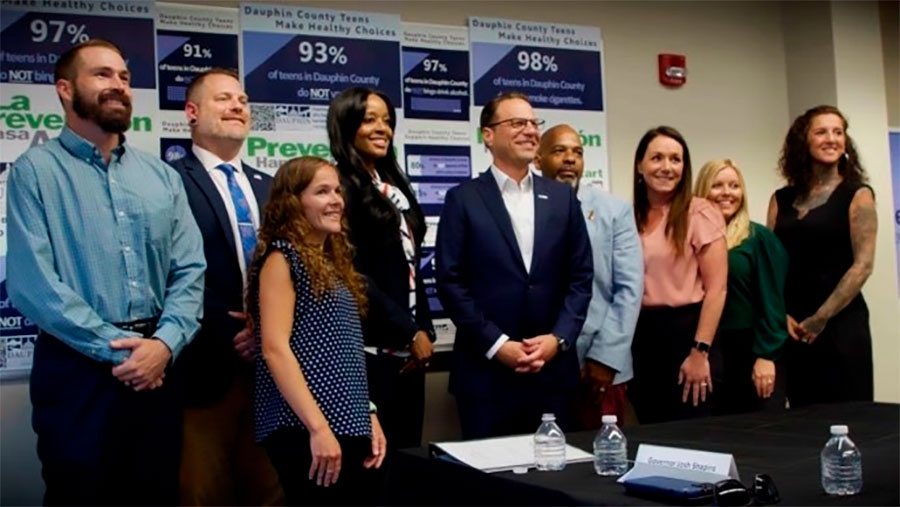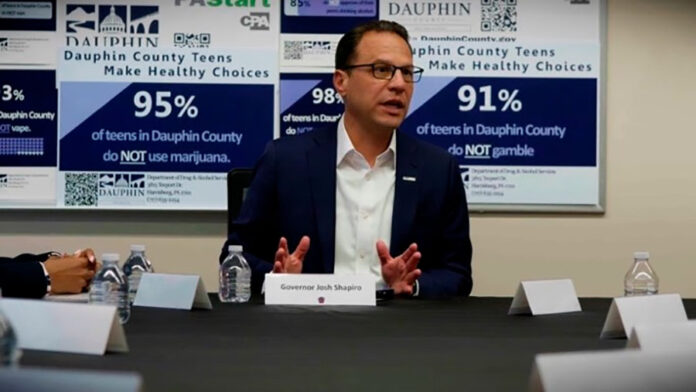DDAP’s student loan repayment program is partially funded from opioid settlement money Governor Shapiro helped to secure during his time as Attorney General.
With this latest round of funding, the Shapiro Administration has invested more than $40 million since taking office in helping nearly 675 professionals working in Pennsylvania’s drug and alcohol field through DDAP’s student loan repayment program.
Harrisburg, PA – Last week, Governor Josh Shapiro and Department of Drug and Alcohol Programs (DDAP) Secretary Dr. Latika Davis-Jones met with recipients of DDAP’s substance use disorder (SUD) student loan repayment program during a roundtable discussion at Dauphin County Drug & Alcohol Services. Through the program, DDAP provides student loan repayment as an incentive to retain SUD practitioners, administrators, and supervisors who commit to continuing to provide services within Pennsylvania.
In this latest round of funding, DDAP is awarding $22 million to assist approximately 400 practitioners within the SUD treatment, prevention, case management and recovery support services workforce. The program prioritizes SUD professionals who work in rural areas of the Commonwealth that are experiencing SUD workforce shortages as well as those who provide SUD services in counties with underserved minority populations.
“For me, as Attorney General, one of the best ways we could try and save lives was by holding the people accountable who were poisoning our communities,” said Governor Shapiro. “The reality is, this epidemic we’re facing, is as a result of the greed and the lies of the pharmaceutical executives and a handful of pharmaceutical companies who said these painkillers weren’t addictive. I was one of about four attorneys general in the whole country that led an effort to hold these companies finally accountable for what they did. They have paid billions of dollars to the Commonwealth of Pennsylvania to support people who are in recovery. The supports are only as good as the staff and the team who are available to deliver them. One of the first issues we diagnosed was that we just didn’t have enough people doing this work. We were able to use a good portion of that money to provide loan forgiveness for people who were doing the important work in helping those in recovery, helping them on their road to recovery.”
High rates of turnover and shortages of health care professionals in the SUD field have placed increased pressure on employee recruitment and retention, and limited access to care for Pennsylvania residents seeking treatment and supports. At Dauphin County Drug and Alcohol Services alone, 16 workers have resigned across all departments since 2021, with over 60 percent of those resignations in the case management or prevention fields.

Through this SUD loan repayment program, county offices like Dauphin’s will be able to retain talented workers who provide these life-saving prevention, treatment and recovery programs.
“We’re easing the burden of student debt, and in many cases, totally eliminating it,” said Secretary Davis-Jones. “This program is one more example of the Shapiro Administration’s commitment to strengthening drug and alcohol treatment and systems of supports in Pennsylvania. It’s a win-win; helping to incentivize SUD professionals to remain in this field which will, in turn, benefit our loved ones, friends and neighbors who need SUD services most.”
Governor Shapiro and Secretary Davis-Jones met with four recipients of this latest round of funding to hear firsthand how these dollars will help them stay and thrive in a field they love.
“I am extremely grateful of the opportunity DDAP has provided me,” said Ashley Schappe, Case Manager, Schuylkill County Drug and Alcohol. “Working in the field of substance use disorder isn’t always easy and can be quite challenging but I will take the extra step to help someone in need. With this opportunity it will allow me to continue working on my own professional development in the field without having the burden of student debt.”
“This opportunity allowed me to really shift my focus to my goals and further development within my career,” said Pyramid Healthcare Detox Manager Lyndsay Camaroto, who was a $100,000 loan repayment recipient. “Professionally it allowed me to complete training and education for my trauma-informed care certifications and social work licensure. Personally, it has allowed me to be better able to provide for my family, work towards being completely debt free, and shifting focus on my eldest daughters plans for college.”
The SUD loan repayment program is designed to help staff in DDAP-licensed drug and alcohol treatment facilities, as well as staff providing Single County Authority (SCA)-funded prevention, case management, and recovery support services in the Commonwealth. The program also allows workers in the field who provide SUD treatment, prevention, case management and/or recovery support services for SUD at an approved practice site to receive repayment assistance for their outstanding, qualifying educational loans.
According to the program criteria, awardees must have the capacity to continue to deliver SUD treatment, SCA-funded prevention, case management or recovery support services at an approved practice site(s) for a two-year period. Qualifying professions include, but are not limited to:
· Physicians
· Psychiatrists
· Registered Nurses
· Certified Registered Nurse Practitioners
· Certified Addictions Registered Nurses
· Licensed Social Workers
· Certified Clinical Supervisors
· Certified Alcohol and Drug Counselors
· Counselors
· Case Managers
· Prevention Specialist/Managers
· Administrative Staff
Grant agreements will be awarded based on the availability of funding. The funding amounts will be up to $75,000 for full-time professionals and $37,500 for half-time professionals. Final award amounts will be determined based on the amount of grant assistance being requested and additional criteria.
Under a similar program in 2022, more than 270 SUD practitioners including case managers, counselors, licensed social workers, physician assistants, and registered nurses were awarded funding totaling almost $19 million to go towards repaying their student loans.
Both rounds of grants were funded through the McKinsey Opioid Settlement Fund and Pennsylvania’s Medical Marijuana Program Fund.







